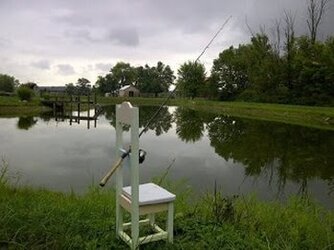 A very conclusive Third Round of queries was sent out on February 6th, 2013, and I say that because for now I am content with the idea of waiting. This was another small round, but one of increasing amount which brings the total queries out now to a whopping twenty. For the Fourth Round, which will happen after a certain thing occurs which I'll mention here in a bit, will consist of twenty and will bring the query total to four rounds equaling forty. More rejections have come this time around, making me think that this Third Round has been crafted well enough to be accepted regardless of the yeas or neas. Slowly but surely the rejections are trickling in, and I couldn't be more thrilled! The material is circulating this time, quite possibly being a topic of discussion in some New York offices as agents shrug and make their decisions with their interns and fellow agents alike. This is fun to imagine. On the other hand, it may be time to review the submission guidelines for the first two rounds and go ahead and either resubmit or mark them as "Rejected." It really doesn't make a difference when one considers that some agents have a policy of no response = rejection, and so why not clean up my list for this new revision that I ... uh-oh. The cat's out of the bag. Yes, I am doing another revision of the manuscript that I'm currently submitting because quite frankly, I can and because I've done lots of reading lately and I need to bring certain things up to par. The Internet has been a great resource in this regard, following Twitter feeds of certain agents that literally walk you through their query review process and reveal what they did and didn't like. For an example of this, check out Ann Collette at the Rees Literary Agency on Twitter @Ann_Collette. The Internet has also been invaluable to the imparting of wisdom to us writers, especially the ones who are knee-deep in the query process. While finding it hard for me to work on my next book with all of this query uncertainty, I stumbled across Noah Lukeman, President of Noah Lukeman Literary Management, and his blog where he says among other things: Finally, there should never be any downtime in your writing. Writing is a muscle, and the more you write, the better you will become. When you finish one book, turn immediately to the next, and don’t use a submission as an excuse to take a break and not do the hard work of continuing to write every day. A writer should never be "waiting" -- only "writing" or "submitting." In fact, the word "waiting" should not even exist in the successful author’s vocabulary. Wow, huh? Because of this very blog I have not only started up on my new book again, but I am simultaneously doing a very brief and more-readable revision of the book I'm submitting. It's as if I'm starting over again, and in this case, I couldn't be happier. The reading research also continues with the recent completion of the very-successful industry goliath, Fifty Shades of Grey by E.L. James. I will say this: I understand the appeal, but this book was so horribly written that as a writer I found it hard to finish. It has thus gone right up there now with some of the densest of dense English prose that I've ever had to wade through. Fifty Shades of Grey walks that fine line with me of learning what I don't want to do, yet seeing what it was that someone did do in order to get published.  Early last month I sent out the Second Round of query letters to prospective agents in and around the New York City area. With regard to the First Round, I didn't get so much as a bite. But there was a certain peace that came with the waters being that calm, knowing that I was learning how to swim by being thrown into the pond, and that this would be my first feel of just how cold the temperature of those waters really were. I'd read somewhere that email queries to literary agencies sort of exist on a quid pro quo basis, which is to say that emails in theory don't take much time to write and send, so why should agencies even bother with a response? There were two lessons learned here. The first lesson was that, at least for me, the obsessing over format right down to the font size of these emails was quite time consuming in itself. Even now as I get ready to send out my Third Round, I'm constantly modifying what I've sent the first two times according to what I think worked and didn't work, and this includes revising the actual Query Letter and Synopsis over and over again on an agent-to-agent basis. That being said, the bigger lesson learned was that these agencies receive hundreds upon thousands of these emails regardless of how much work was put into making the submissions beautiful, and they have every right to just not respond if the material doesn't fit their needs. But I did get a few nibbles on the Second Round, if only just pecks at the hook as it dangled in the water, in the form of a grand total of two rejections to date. And as I knew would be the case, I was exhilarated, knowing that at least I was playing the game and getting some sort of return. Someone, somewhere, now knows that I want in. And so the learning continues as I move forward with the Third Round (which I plan to send off this week), a batch that was originally intended to be a blitzkrieg covering both coasts, but has now been downsized to make room for more of those valuable lessons to occur. It's much more important to send out quality versus quantity at this stage, because if there is some sort of deal-breaking mistake being made on only your second round of queries, it's better to be able to take that data and refine it for fishing in the next pond rather than having no more ponds to fish because you've thrown out all of your hooks. Oh, look, I've burrowed deep into a new metaphor. But I like the investigative reporter one better (see "All the Publisher's Men ... and Women" above)! And as was the case the first time around, I read in order to get a better understanding of what it is that I write and am trying to sell. And it looks like what I write is the difficult-to-market, non-genre classification that has become a genre unto itself, the lofty-sounding "Literary Fiction." John Grisham's A Painted House was instrumental as part of this discovery, as I found myself missing the characters and their struggles long after I turned the last page of this modern-day and off-trajectory effort from the author, a To Kill a Mockingbird for this generation. |
Categories
All
Archives
February 2021
|